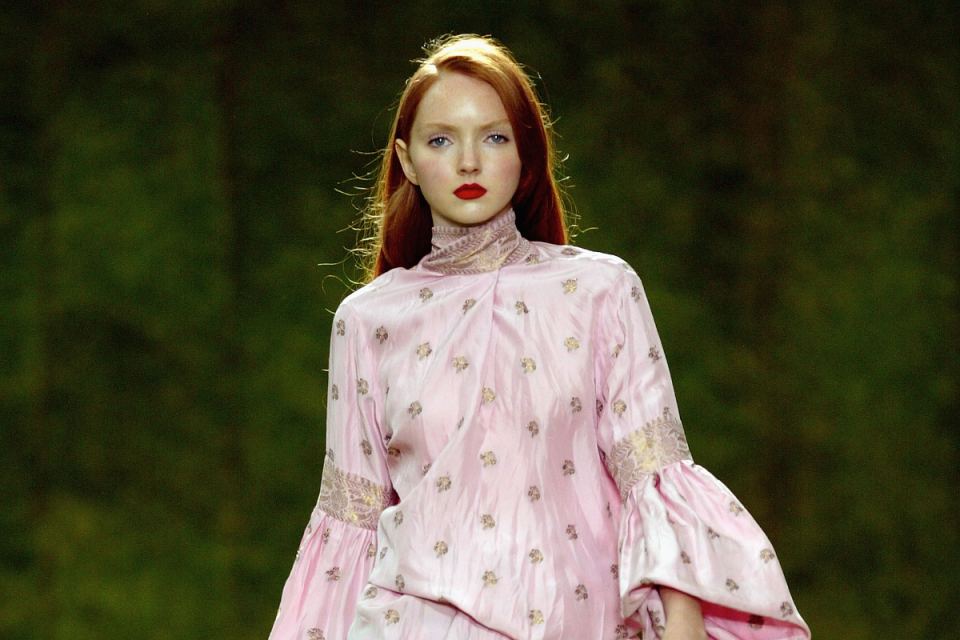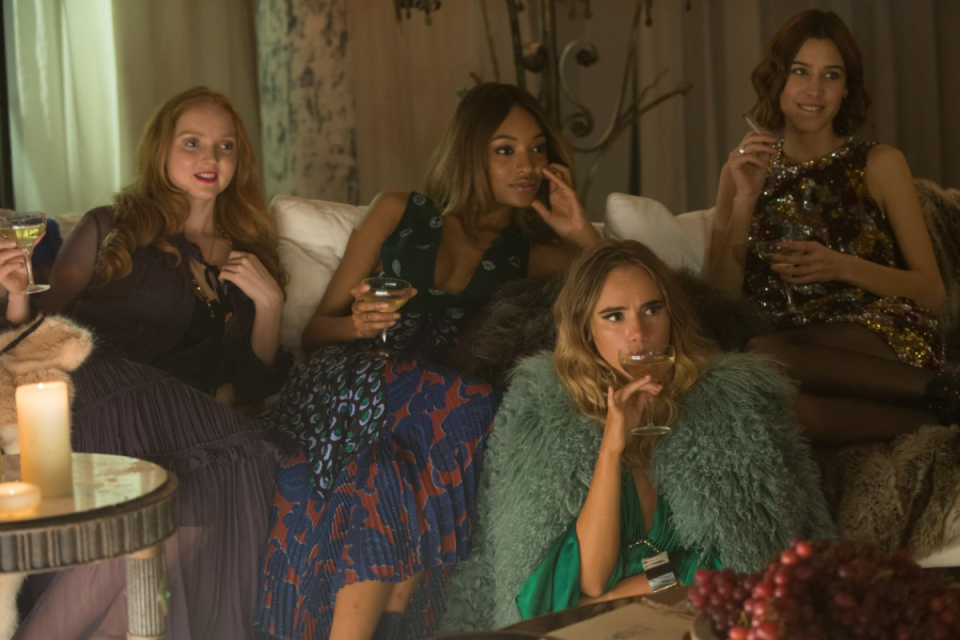Lily Cole on returning to modelling: I’m opinionated now – I do my own hair and makeup

Lily Cole has been an actor and a model, but the 36-year-old is now focused on changing our washing habits. Could she be the rare case of an actor without an ego big enough for Hollywood?
Throw back to the mid-noughties and the Saltburn-era of British fashion, and there was another style icon as ubiquitous as the popped collar and the Ugg boot: Lily Cole. Her ceramic complexion and flame hair gave the model from Devon an otherworldly beauty that led her to become the first model to be booked for British Vogue aged 16. In 2004 she was awarded Model of the Year at the British Fashion Awards.
By the turn of the decade Cole had established herself as a leading actor, playing opposite Heath Ledger in The Imaginarium of Doctor Parnassus and with memorable turns in era-defining comedy-drama St Trinians as well as roles in the Absolutely Fabulous movie and Star Wars: The Last Jedi.
But while Cole was fraternising with the A-List, her interest in pursuing projects without a lack of commercial vision was becoming clear. Many actors sign up to charitable causes, but Cole’s CV was particularly wide-spanning.

At the height of her commercial success in 2013 she launched Impossible, a social enterprise for solving social issues which she described as “more enjoyable than modelling”. The same year Cole received the Doctor of Letters qualification for her “outstanding contribution to humanitarian and environmental causes” from Glasgow Caledonian University. In 2011 Cole graduated from Cambridge with a rare double-first in the History of Art, and during the same era, contributed to eco-friendly books including Green Is The New Black.
Now she is patron of the Environmental Justice Foundation and The Ethical Justice Foundation and an ambassador for Beauty4Empowerment, a UN-affiliated organisation.
Did Lily Cole turn her back on Hollywood?
Aged 36, Cole hasn’t starred in anything mainstream since the TV series Upstart Crow in 2018, despite her acting often being a critic’s hit. In an ageist industry, it’s possible Cole hasn’t been offered the roles she was when she was in her twenties. But there is something about her that feels different from the stars who might be inclined to take a project with a major studio to maintain their profile.

You sense that Cole doesn’t care much about fame, and is more interested in pursuing projects that genuinely interest her. Living without much of an ego is a rare thing to suspect of an actor and when I – gently – ask Cole how she feels about mainstream success, she proves my point.
“That’s a good question,” she says, making a sound with her mouth that suggests she hasn’t thought about the topic for a while.
If you’re trying to do something different it means that it’s not always going to have a big audience
“Erm. I don’t think I’ve ever put commercial success to the forefront. I think I try to just do what feels authentic and honest to me. You never actually know, sometimes things I’ve done that have been very successful and had lots of traction surprised me, and then things I have laboured over and thought were gonna be bigger have ended up being very small, so I feel like it’s not always possible to anticipate what lands or not. Of course one has to be open to markets and audiences and not exist in a total bubble. And there’s probably a sweet spot somewhere between being open to those influences but also trying to be authentic to your own voice and do something different.”
She pauses again. “If you’re trying to do something different it means that it’s not always obvious if it’s going to have a big audience or not.”
Cole hasn’t moved away from Blockbusters to focus entirely on environmentalism. She’s focusing her creativity too, through surprisingly niche film projects. She has just directed Mother Weaver, a short film about art collector Ursula Hauser, but it’s so underground it’s not featured on her Imdb page. In 2018 she directed the short film Marble Hill (again, not on her Imdb) about a “really hardcore environmentalist” who has chosen to live off-grid without any technology or electricity. Has she turned her back on the relentlessness of fame rather than having been rejected by it?
“I absolutely love acting when it’s the right project, a character I feel inspired by, when it’s a story I feel inspired by, a team of people I want to work with, it’s one of the best jobs in the world. Finding that intersection doesn’t happen for me all the time, so I’m quite happy to just not. I’ve got plenty of things to work on, including as I said, trying to write and direct and produce [she’s currently working on a screenplay for a feature length film]. I’m sort of delighted when a good opportunity comes in, but I’m not trying to live off it financially so I’m trying to keep my lens on what I choose to do to be determined by when I get excited by a project which hasn’t actually happened recently. But hopefully will happen again!”
We’re speaking because Cole is promoting a new campaign by ethical cleaning brand Ecover promoting the idea that we should wear our clothes more than once before we wash them to help reduce our eco-footprint. It’s based on new research conducted by the firm. Figures from the Office for National Statistics reveal a 9.6 per cent rise in wash loads in households between 2005 and 2014.
Does she spend much time worrying about whether her projects will resonate with audiences?
“I don’t to be honest,” she says matter of factly. “I don’t think that’s my… job… necessarily. I’m not a marketeer, and I think a lot of the things that I’ve spoken about in the past or campaigned around are not always like sexy, headline grabbing topics. I don’t try to manipulate my message to make it more mainstream.” She laughs at the idea as if it were a crazy thought. “I just speak honestly on things I care about and then you see what resonates and what doesn’t.”
The laundry campaign has actually generated the sort of tabloid coverage Cole garnered in her earlier career; the Daily Star ran a piece entitled “Supermodel Lily Cole is demanding we wear our grubby grundies for several days to save the planet.”
“That’s funny,” she says, heartily laughing, dispelling any fear that she is prim or overly-academic at every turn. “I haven’t seen that but I anticipated that someone would do that. Just for the record it’s very clear that it’s not about underwear and the report and campaign is definitely not encouraging anyone to wear their socks or their underwear or their gym clothes more than once. There are definitely things that need more washing, but do you have to wash your jeans and your tee shirts every time you wear them or is it sensible to check before you wash them?”
“I don’t know if you’ve seen the report they commissioned but I thought it was quite interesting from several different perspectives. I find in a geeky way the history of the development of laundry practices quite fascinating. How it’s changed over the years and how the norms we have today are arguably quite recent. Where they’ve come from, how they’ve shifted in recent decades and how potentially advertising and marketing and commercial interests have driven the norms we have around laundry. I find it quite fascinating.” Mark Boyle, her friend and the environmentalist from Marble Hill who doesn’t use anything made post Industrial Revolution, said giving up his washing machine was the hardest part of his journey. “That sort of stuck with me. The hardcore position would be not to use a washing machine, right? The less hardcore position is can we change our relationship to them? Or our habits with them?” The campaign is absolutely not advocating for doing away with washing machines, she reminds, then she laughs and makes up a new Daily Star headline: “She wants you to lose your washing machine! Never wash your underwear ever again!”
There has been the suggestion that Cole is formidable – but in my experience, that’s only if you haven’t done your homework. As you’d imagine, she is acutely intelligent about a wide range of subjects, and like many clever people, you feel that the idea of having small talk makes her shudder. We do it anyway: when I ask if she has morning sea swims where she lives in Lisbon she replies with just the right amount of words that is polite without going a syllable further. “I don’t have many morning swims, no, but I am surrounded by nature in Lisbon; it’s beautiful.”
Read more: Kate Moss, Cara Delevigne and Lily Cole are in Vogue at the National Portrait Gallery
I bring up modelling because she returned to the catwalk for London Fashion Week this year after telling The Guardian she would never model again. “Well that’s actually why I try not to say anything definitive about the future because you never know what’s going to come and surprise you!” She returned for sustainable fashion brand Completedworks’s show, and says she took more control of her hair and make-up than when she was younger and got bossed around by fashion big-wigs. “I probably am a lot more opinionated than I used to be in terms of what I think in those situations,” she says. “This wasn’t a classic modelling job, it was a performance piece.”
Keep her on topic – and that can be about anything from washing dirty undies to the scorched Earth or her feminist-tinged screenplays – and she is funny as well as refreshingly self-effacing. “You think I’m more niche now?” she asks with trademark directness. “Hahahaha. Yeah, erm, I mean I don’t love doing things I don’t believe in. If I was doing stuff that was bombastically mainstream but my heart wasn’t in it, that doesn’t feel good to me. I think I’d rather do things that have a smaller audience but feel aligned with. I’m not lying, basically, I’m not lying to myself, to people in the process. That feels better.”
Download the full Ecover laundry report which Lily Cole is promoting
